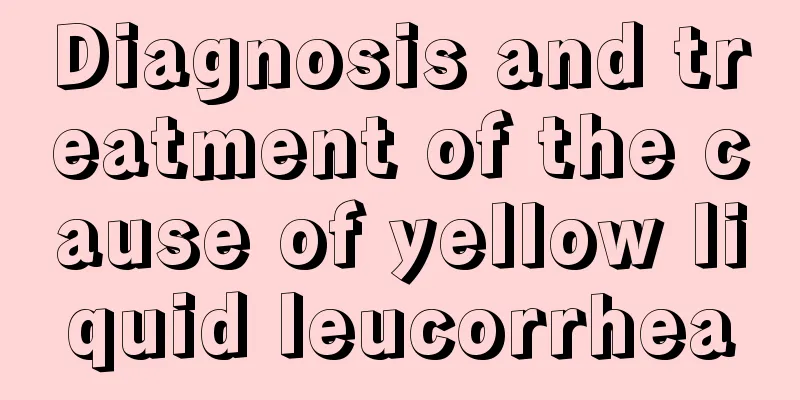What is white flesh during menstruation?

|
Many female friends find that there are white lumps in their menstrual blood. In fact, this may be the shed endometrium. If it is not the endometrium, you need to pay attention to your own health and seek medical treatment in time, because it is likely to be closely related to a certain function of your body and must be treated through professional methods. Female friends need to pay special attention to this issue. 1. What is white flesh in menstruation? During the menstrual cycle, the endometrium is shed periodically, forming menstruation. Normal menstrual blood is dark red and contains endometrial fragments, cervical mucus and exfoliated vaginal epithelial cells. Therefore, if there are white lumps in the menstrual blood, it is basically considered to be the exfoliated endometrium. However, mucus plugs secreted by vaginal and cervical inflammation cannot be ruled out. If there are no clinical discomfort symptoms, follow-up observation can be performed. You can also go to the hospital to have vaginal secretions tested and color ultrasound checked to rule out organic lesions of the uterus and ovaries. The lumps may be the shed uterine membrane If you are sure you are not pregnant, it is nothing. If you are pregnant, it is a miscarriage. It is embryonic tissue. In addition to blood, menstrual blood also contains fragments of endometrial shedding, cervical mucus and vaginal epithelial cells. In your case, it may be fragments of endometrial shedding, cervical mucus and vaginal epithelial cells, which is normal. It is recommended that you relax, observe closely, and go to a regular hospital's gynecology department in time if there is any abnormality. 2. Precautions during menstruation During menstruation, women's bodies will be relatively weak and there are many aspects that need to be paid attention to. During menstruation, avoid strenuous exercise, such as high jumping and running. Strenuous exercise will make girls' already weak bodies even more uncomfortable, and may even cause symptoms of dysmenorrhea and menstrual disorders. During menstruation, do not eat spicy or irritating foods, and do not eat raw or cold foods. Stay away from strong tea and liquor. Too much caffeine in strong tea can cause dysmenorrhea in women; the tannic acid in tea can combine with the iron in food, thereby affecting the absorption of iron and causing anemia. During menstruation, do not use blood-activating and blood-stasis-removing drugs, otherwise it may affect the menstrual volume, cause heavy bleeding during menstruation, or prolong the menstrual period. 1. Sexual intercourse is not suitable. During menstruation, the endometrium is shed and wounds are formed on the surface of the uterine cavity. During sexual intercourse, it is easy for bacteria to enter the uterus retrogradely, causing intrauterine infection, adnexitis, and pelvic inflammatory disease. 2. Do not eat too much salt. Eating too much salt will increase the salt and water storage in the body. You will experience headaches, excitement and irritability on the eve of menstruation. You should start eating low-salt foods 10 days before menstruation. |
<<: Can I do angiography on the 12th day of my period?
>>: Why do women get hyperthyroidism?
Recommend
What should I do if I get oral ulcers caused by heat? Recommend three dietary therapies
Oral ulcers caused by internal heat is a very com...
Food Safety | Pears are rich in nutritional value, but these types of people are best to eat less!
...
Causes of multiple uterine fibroids
Many female friends may not know the cause of ute...
What if I catch a cold one month into my pregnancy?
We all know that women's bodies are more frag...
What to do if you have vaginal bleeding after sex
It is normal to bleed after your first sexual int...
Can I drink alcohol during my period?
Can I drink alcohol during my period? We all know...
Counterpoint: Nearly 500 smartphone brands have exited the market since its development
The smartphone market is one of the most competit...
Things to note after artificial insemination pregnancy
With the improvement of the quality of living sta...
Irregular periods
Menstruation and leucorrhea are both barometers o...
I start drooling when I pass by a bakery. Is that tempting aroma fake?
Whenever I pass by a bakery, I always smell a fra...
How many varieties of sugar apples are there? What to do if you get angry after eating sugar apples
The ingredients in the sugar apple fruit provide ...
What is the cause of milky white and sticky leucorrhea?
At a time when gynecological diseases are prevale...
What is the reason for women's yellow urine
Urine contains a large amount of waste substances...
If you have recurrent oral ulcers that do not heal, be alert to Behcet's disease!
Author: Mu Rong, Chief Physician, Peking Universi...
What are the symptoms after IUD removal?
From a medical point of view, whether a woman has...









